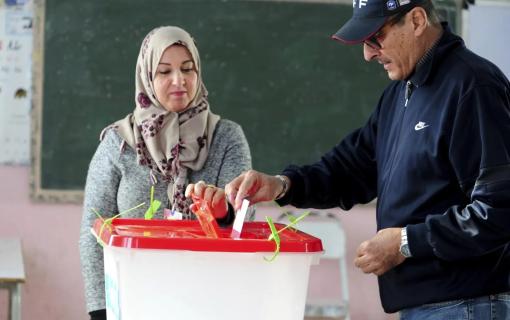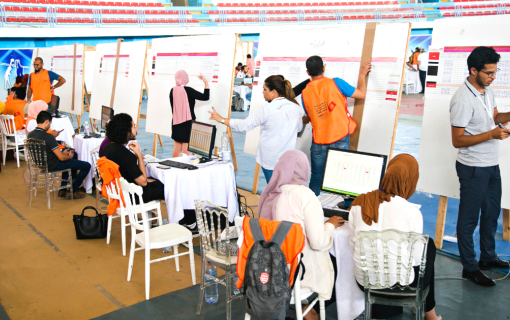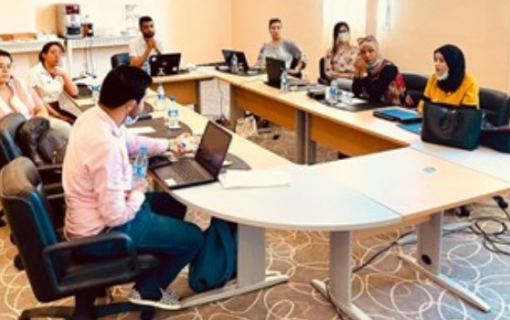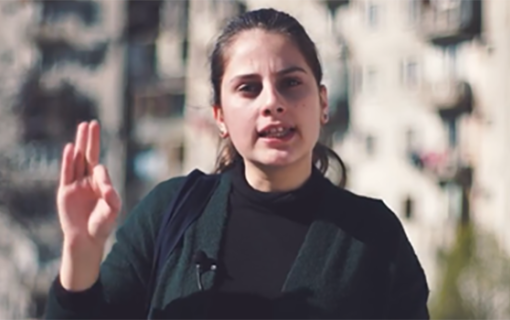Poll Worker Trainings ahead of Tunisia’s Parliamentary Elections
On September 30 and October 1, the International Foundation for Electoral Systems (IFES), in partnership with the European Union, the United Nations Development Programme and the Tunisian election management body, the Independent High Authority for Elections (ISIE), organized a training of over 300 master trainers on the procedures for operating polling stations in the parliamentary elections on October 26. This training is the first of three levels in a cascade training plan created by the ISIE’s Training Department with support from IFES. The participants travelled from all 27 electoral districts in Tunisia to Hammamet, where the training took place.
Over the past few months, IFES has assisted the ISIE in developing a Polling and Counting Manual for poll workers. The manual provides detailed instructions on all aspects of running a polling station, including setting up and opening the station, the duties and responsibilities of poll workers and how to respond to various problems that may occur and counting ballots. IFES will also print 40,000 copies of this manual to be distributed to poll workers during the next levels of training.
The second and third levels of the cascade training plan will take place in the coming weeks. First, the 300 master trainers will return to the ISIE’s regional offices (IRIEs) and train 15,000 polling station and polling center Presidents between October 7-11, using the knowledge and skills they gained during this training. Then, on October 12, the Presidents of polling stations and centers will train approximately 50,000 poll workers across Tunisia. Each IRIE will also set up an operations room to provide support to every polling station and center on Election Day.
On the first day of the training for master trainers, facilitators used the Training and Counting Manual as a foundation for their presentation on the procedures for operating a polling station. Facilitators also led discussions about common problems and difficulties that poll workers could face on Election Day. On the second day, the participants were broken up into ten smaller groups and each group ran a simulation of operating a polling station on Election Day. Participants took on roles of the President of the polling station, poll workers, observers and voters.
The simulation began with the set up and opening of a polling station, including details about where signs should be displayed and how to prepare the ballot box. Various types of voters then entered the polling station and the poll workers were faced with problems that they resolved based on the rules and procedures in the Polling and Counting Manual. These problems included: an illiterate woman who wanted her brother to assist her while she voted; a woman wearing a niqab who refused to show her face to the poll worker checking IDs; and an observer from a political party who attempted to influence voters. Finally, the simulation ended with the counting of ballots and posting of results.
The participants actively engaged in the simulation, making sure they understood each procedure clearly and even devised their own scenarios that could pose problems. Throughout the simulation, facilitators observed and answered questions as participants discussed how to respond to the different scenarios they encountered.
Chafik Sarsar, the President of the ISIE, spoke to the participants after they completed the scenario on day two of the training. He thanked all the master trainers for their presence and dedication, declaring that “this training is the backbone of the success of the elections.” He also stressed the importance of a unified message from all trainers when delivering trainings to polling station Presidents and staff.
Under its award from the U.S. State Department’s Middle East Partnership Initiative, IFES’ advisors have worked closely with the ISIE’s Training Department as it prepared to implement the cascade training plan. The smooth and effective operations of polling stations across Tunisia will be essential for a successful legislative election on October 26, and this training is the first step. IFES will continue to assist and support the ISIE as it oversees the second and third levels of training and begins to distribute polling materials to its regional offices.









